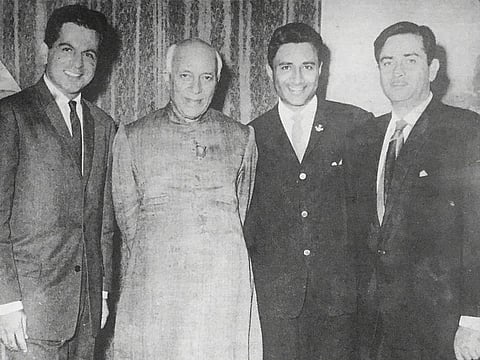Dilip Kumar showcased and represented an innocent India
The essence of a democracy is that citizens have a right to dissent without violence

When perhaps the greatest Indian movie actor, Dilip Kumar, died a fortnight ago at the age of 98, there was a rush of quaint black and white pictures, tributes and memories.
Mostly people reminisced about his acting prowess, how kind he was, non-starry in the best sense of the term, his perfect Urdu and diction and wide ranging interests.
I saw a black and white picture of him with Raj Kapoor, Dev Anand — the trinity of the Hindi film industry as they were apparently called — with India’s first Prime Minister, Jawaharlal Lal Nehru in the middle.
I shared the picture captioning it “a more innocent age”. All the three superstars were dressed in formal suits with ties and Nehru was dressed in an achkan (knee length jacket), with his famous rose wilting a bit in the picture.
Nehru was a fan of Dilip Kumar’s acting talent but, what really struck you about the picture was a sense of equality of the four men — no one was genuflecting before the power of the government of India — represented by Nehru — India’s first prime minister.
Zero projection of power optics
The picture showed a casual ease — four successful men comfortable without having to project power optics. This was a political leader whose people held affection for him and the three acting giants had a huge fan base across the world.
Raj Kapoor was a craze in Russia, Dilip Kumar had gotten Hollywood offers (and turned them down) and Dev Anand produced some quality Hollywood style films noticeably The Guide with ambitions of making it big in Hollywood.
The partition of India was still fresh and all the three actors were refugees from Pakistan, yet they had no need to score political points to prove an urgently demanded crude loyalty test.
Nehru did not unleash the then version of the enforcement agencies on actors he did not like.
I obviously missed this era of India and films because I was born post Emergency but some precious things seemed apparent to me which we have sadly lost.
Contrast that era with India today. Our trinity of superstars Shahrukh Khan, Aamir Khan and Salman Khan have virtually been forced into silence by the trolls of the ruling party who perpetually question their patriotism.
Recently when Aamir Khan announced his divorce from Kiran Rao, India’s social media was awash with trends of #loveJihad — an imaginary bigoted construct — which claims that Hindu women are lured into relationships and forced to convert. Official handles of the ruling party tweeted in support of these hashtags and asked for a ban on Khan.
Back in the day Dilip Kumar was similarly attacked by a regional party when he was awarded Pakistan’s highest civilian honour — Nishan-e-Imtiaz. An intemperate MP from that party asked him to return the award.
Yet Kumar was granted time immediately by the then Prime Minister — Atal Bihari Vajpayee — who firmly conveyed his disapproval of the attack on Kumar. In a series of interviews, Kumar — as only he could — called out the inherent “fascism” in the attack on him.
Imagine what would happen today if one of the three superstars on mute even muttered the word “fascism” under his breath. An earlier comment by Aamir Khan on what Rao perceived as “growing intolerance in India” ensured that the ruling party proved the point to him.
Unlike Vajpayee, we don’t have a single leader in the government or even in the opposition who would take a stand and ask the bullies to cease and desist.
These days ministers tell journalists, who they don’t like, to “go to Pakistan”. I have been told that so often that I thought it was hilarious and asked if the trolls represented a tourist body in Pakistan.
The hope for tomorrow
Kumar’s India in the beginning was an innocent India filled with hope for a better tomorrow. That tomorrow is here and sadly bigotry has belied the hope.
Some years ago a publication which is the mouthpiece of a political party did a cover story on the “sinister conspiracy of all three superstars of the Hindi film industry being Muslim”.
Most people laughed since the publication — in its selective vision — had forgotten the era of superstar Rajesh Khanna and his successor Amitabh Bachchan.
These days however the theory would have been mainstream part of some sinister conspiracy which would give grist to the WhatsApp mill, weaponised, for say, the Uttar Pradesh elections.
The essence of a democracy is that citizens have a right to dissent without violence and dissent does not draw adverse notice from the government. We seem to have lost that precious right. And, the creativity of actors is being throttled.
No actor can perform in a void and we see that loss in the second-rate safe content which is now being dished out. Even OTT platforms have been brought to heel and made to apologise for hurting sentiment and censoring content based on some fringe group’s outrage.
If a group can offer a bounty for cutting off Deepika Padukone’s nose, how much progress has India made in artistic freedom?
So when you criticise actors for not measuring up to Dilip Kumar, do remember that creativity cannot flower in fear.
We’ve lost so much and gained only fear.








